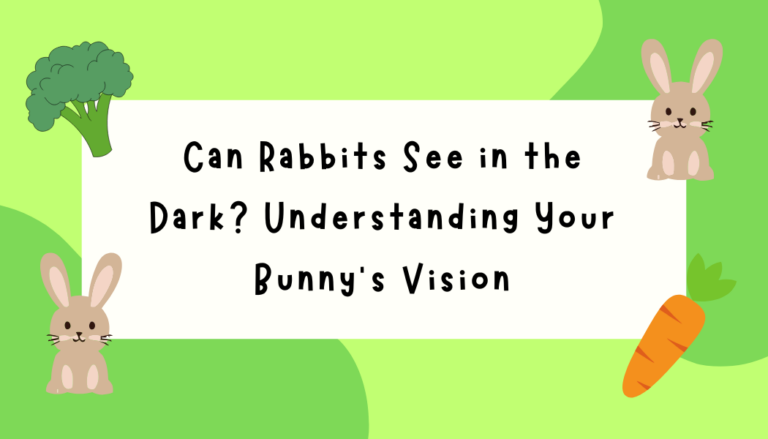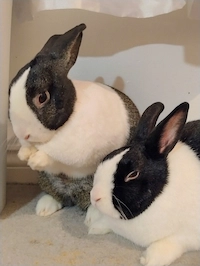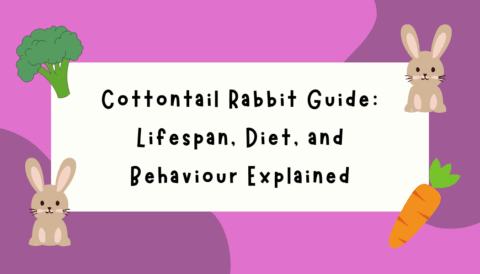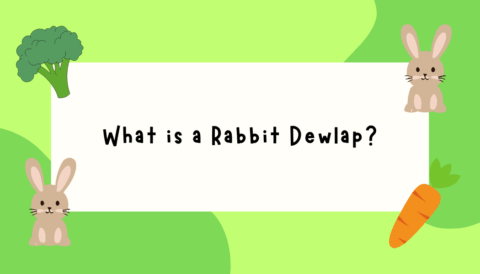Table of Contents
How Well Do Rabbits See?
Rabbits have uniquely adapted eyes that offer them impressive visual abilities. Their large, round eyes are designed for wide peripheral vision – up to 360 degrees around them, with only a small blind spot in front of their nose. This gives them a major advantage in spotting predators, but it also impacts how they interact with their environment. Jet and Leo seem to spot a stray food nugget from miles away!
Rabbits are crepuscular animals, meaning they’re most active at dawn and dusk when natural light is lower. This leads to the question: How do they handle vision in dim or dark conditions?
Can Rabbits See in the Dark?
Here’s the short answer: No, rabbits can’t see in complete darkness. However, their vision is low light is much better than ours.
Rabbits can’t see in pitch black, like a cat or some nocturnal animals might, but they have excellent night vision compared to humans. Rabbits rely on a special adaptation in their eyes known as the tapetum lucidum, a layer behind the retina that reflects light back through the eye, allowing them to see better in dim environments. This gives them a significant advantage in twilight conditions, which is when they’re naturally most active. Jet and Leo’s eyes seem to have a subtle glow in the dark!
How to Support Your Rabbit’s Vision at Night
Even though rabbits have excellent low-light vision, it’s still important to ensure their living space is set up to accommodate their needs. Here are some ways to help your bunny thrive in the evening hours:
- Provide Low-Level Lighting: While rabbits don’t need bright lights, they do benefit from soft lighting during the evening. This helps them navigate their environment without straining their eyes or feeling disoriented. Since Leo and Jet are most active at dusk and dawn, I make sure their space isn’t pitch black. I use a soft, rabbit-friendly nightlight in their room to keep things cosy without disturbing their sleep patterns. These low-intensity lights mimic the natural dimming of the day and let them move around safely.
- Create a Safe and Comfortable Environment: Having a safe space where your bunny can hop around without worrying about bumping into things is important. I’ve set up a well-lit spacious area for Leo and Jet using adjustable pet panels, so they can feel secure during the darker hours. I’ve also added some cosy bedding and edible tunnels to make my bunnies feel like they’re in their own little burrow.
- Keep their Natural Rhythm in Mind: Since rabbits are more active at dawn and dusk, you may want to schedule their playtime during these hours. This ensures they feel naturally comfortable exploring in lower light conditions. Jet and Leo love playing with their banana leaf carrot stuffer and stacking cups
- High-quality Supplements: Promote your rabbit’s overall well-being, including eye health, with top-quality supplements like Pro-C Probiotic Powder. These supplements help ensure your bunny stays healthy and thrives both day and night.
How to Recognise Vision Problems in Your Rabbit
Just like any other pet, it’s important to keep an eye on your bunny’s overall health, including their eyes. Even though rabbits have well-adapted vision, they’re not immune to vision problems. If your bunny starts showing signs of difficulty seeing, it’s important to address it early. Some signs of vision issues include:
- Bumping into objects : If your rabbit starts bumping into walls or objects they previously navigated well, it might indicate vision problems
- Squinting or watery eyes: Watery eyes, squinting, or redness could indicate an eye infection, irritation, or even injury
- Reluctance to move or explore: If your bunny is less active or reluctant to hop around, it could suggest they are struggling to see.
If you notice any of these signs, don’t hesitate to make an appointment with your vet. Vision problems can be more subtle but still significant.
Conclusion
So, can rabbits see in the dark? Not entirely, but they can see much better than we can in low light, thanks to their specialised eyes and tapetum lucidum. By creating a safe, low-light environment for your bunny, you’ll help them feel right at home during the darker hours.
If you’re wondering what products can make your bunny’s space more comfortable, check out my favourite bunny-safe nightlight and other accessories. Leo and Jet approve of them, and I’m sure your bunny will too!
If you’ve noticed any signs of vision problems in your rabbit, be proactive and take them to the vet. Keeping a close eye on their health is the best way to ensure they live a long, happy life.




